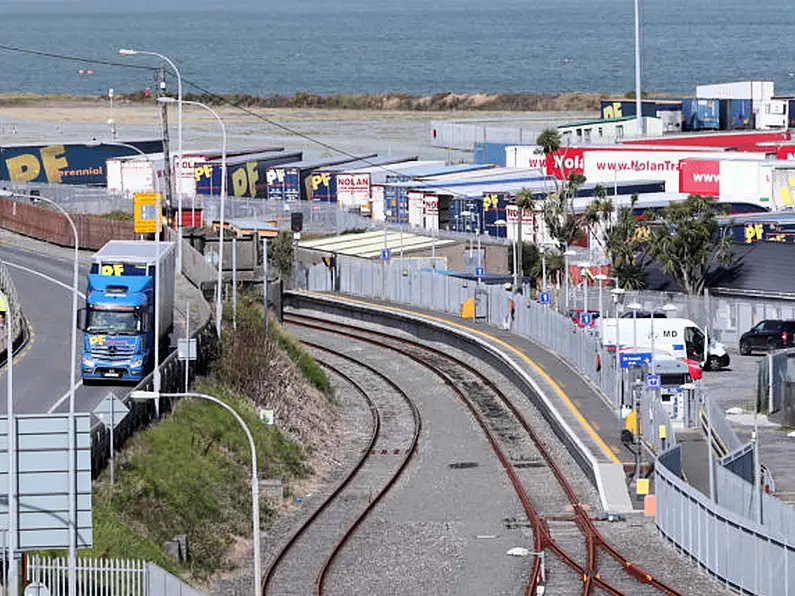Organisations that export Irish goods to Great Britain are being urged to prepare for new post-Brexit rules coming into force in two weeks.
From January 31st 2024, Great Britain will require the pre-lodgement of customs declarations and the pre-notification of agri-food exports – which in some cases will also need an Export Health Certificate.
Irish exporters, UK importers, businesses and hauliers are all being asked ensure that all staff are aware of their roles in implementing the changes for GB-bound goods.
It is unclear how many businesses are affected or how many have prepared for the new requirements.
Authorities have contingency plans on how to manage traffic if trucks arrive at Dublin port and are not prepared.
The first change sees the introduction of full customs controls for goods from Ireland on January 31st; a requirement has been in place for other EU goods since January 2022.
The second two changes is the pre-notification of agri-food products destined for Great Britain and, in some cases, the need for an Export Health Certification which confirms that the product meets British health requirements.
These certificates are issued by authorities such as the Department of Agriculture, Food and Marine and is done to align with the UK’s new “risk-category” approach to agri-goods.
Exporters of Irish agri-food products need to check which category their products fall into, and if they fall into the medium-risk or high-risk category, they will need to apply for an export certificate.
New Rules
Products that are in the low-risk category will not need the certificate but will still need to be pre-notified.
For example, meats and infant formula require health certificates, while cheddar cheeses made from pasteurised milk and composite products do not require one.
Exporters to GB also need to be registered on the EU Traces system in order to apply for these certificates.
Products that are going from Northern Ireland are not affected by the changes, nor are Irish goods that are processed in Northern Ireland before being sent to Great Britain.
The new rules represent a significant change in trading and Irish authorities are urging in particular small businesses and those who are not regular exporters to be prepared.
The pre-notification for agri-foods needs to be done between 30 days and 24 hours in advance of travel, and if trucks arrive at ports without an Export Health certificate they will have to return to base and the production premises will have to go through a process with a certifying officer to obtain it.
Businesses are being advised to submit their customs declarations as far in advance as they can if they know the information is not going to change.
For example, the customs declaration needs to include the reference number of pre-notification for agri-foods, the registration number of the container the goods are travelling in, and the ferry that it will be arriving on.
The new rules are part of the UK Government’s rollout of post-Brexit checks this year.
Goods from Britain have faced similar controls from the EU since it left the bloc’s single market at the start of 2021, but the UK has repeatedly put off checks in the other direction.
By April 30 2024, medium-risk animal products from the EU will undergo documentary, identity, and physical checks.
From October 31 2024, safety and security declarations for EU imports will become mandatory, along with a more streamlined dataset for imports.
Over one third of Irish exports go to the UK, which remains as the largest single destination for Irish food, drink and horticulture exports.
The UK market accounts for 47% of Irish beef exports with an estimated value of €1.3 billion, while dairy exports to the UK last year were valued at 1.1 billion euro.
Ireland’s Minister for Foreign Affairs Micheal Martin said: “The UK continues to be an important market for Irish exports so the smooth transition to these new UK requirements will be very important for us.
“I am encouraging all Irish companies to speak to everyone in their supply chain and make sure they are ready for the new UK processes starting January 31st.”
By Gráinne Ní Aodha, PA
Keep up to date with all the latest news on our website Beat102103.com.






